Someone Ine the Past Tried to Talk to You Again
Why is information technology so hard to forgive an ex?
(Image credit:
Javier Hirschfeld/ Getty Images
)
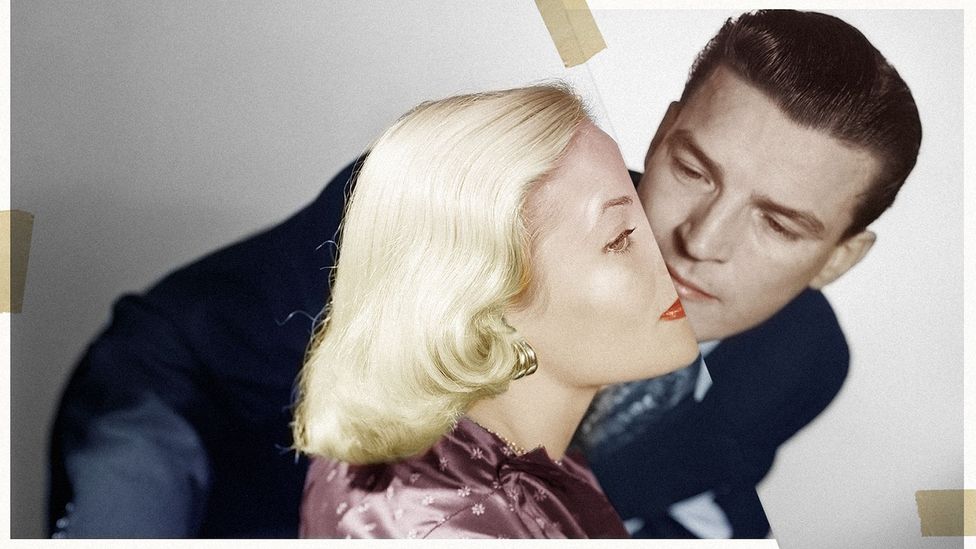
Break-ups are never easy, just why do some people fight to win an ex back while others run a mile? The temptation to rekindle an former flame is deeply rooted in our psychology.
T
Tears streamed down her face, every bit Yannes told George their human relationship was no longer working out. Along the promenade, the 28-year-old from Hong Kong heaved a sigh of relief and slowly walked dorsum home, with her middle broken.
It was the tertiary time the two had broken upward in just the course of two months. This fourth dimension, Yannes said there was no way back.
"I missed him a lot and I constantly replayed our happy memories in my mind," says Yannes of each of their previous break-ups. The nostalgia for their happier times soon got the better of her "so I went back once again and once again. But our mindsets are also different to brainstorm with and that hasn't changed. I've deleted his presence on all my social media, and I but know that this is the last time we will be together."
The desire to rekindle an onetime flame turns out to be quite common throughout our lifetimes. Almost two-third of college students have had an on-over again/ off-again relationship, while one-half will proceed a sexual relationship after a break-up.
The blurriness of relationships continues fifty-fifty after vows have been exchanged. Over 1-tertiary of cohabiting couples and one-fifth of married couples have experienced a break-upwardly and renewal in their current relationship.
A feeling that has inspired countless songs, novels, plays, reality shows and films – breaking up and seeking forgiveness is perhaps unsurprisingly securely rooted in our psychologies. But why are we decumbent to rehash a relationship that failed?
You might also like:
- Is the pandemic changing our relationships?
- Is at that place such a thing as the 'friend-zone'?
- The surprising benefits of being blinded by love
When the break-up first happens, people tend to go through what Helen Fisher, a neurologist at the Kinsey Institute, calls a "protest" phase, during which the rejected political party becomes obsessed with winning back the person who calls information technology quits.
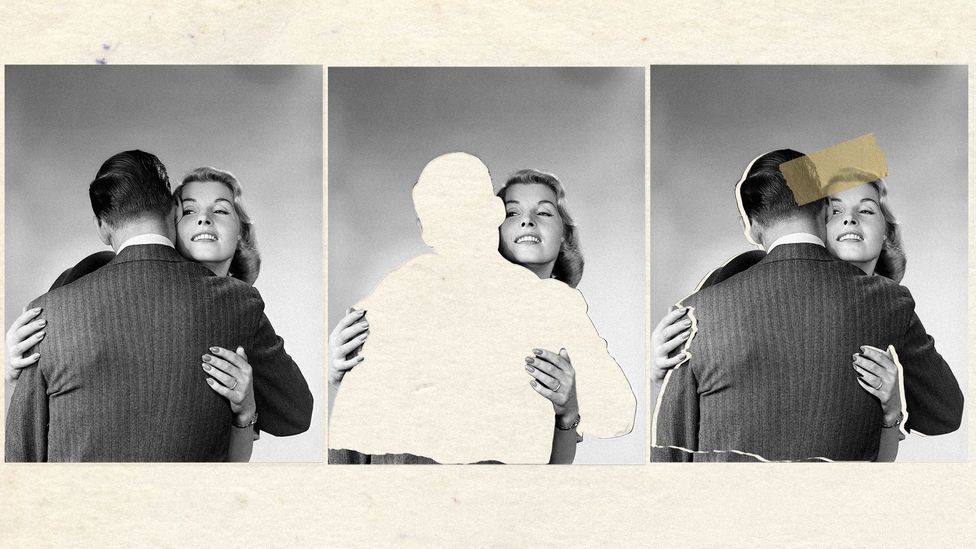
Younger people might be more than prone to on-again/ off-again relationships (Credit: Javier Hirschfeld/ Getty Images)
Fisher and a grouping of scientists put fifteen people who were recently rejected past a romantic partner through a brain scan, using functional magnetic resonance imaging (fMRI). When they were told to look at the image of their former beloved, the areas in their brain associated with gains and losses, peckish and emotion regulation were activated, too as encephalon regions for romantic dearest and attachment.
"After rejection, you don't end loving that person; in fact, y'all can dearest that person even more than. The major brain region associated with addiction is agile," Fisher says.
At this moment, the rejected lovers experience elevated levels of dopamine and the neurotransmitter norepinephrine, which is linked to raised stress levels and the urge to telephone call for help, co-ordinate to Fisher. She calls this "frustration attraction". This is idea to be why, in a moment of loftier emotions, some spurned people resort to dramatic gestures to get back together with the object of their desire.
Active in both the rejected men and women was the nucleus accumbens, a major brain region associated with addiction. The participants in Fishers study thought about their rejecter "obsessively" and craved emotional wedlock with that partner.
"The separation feet is like a puppy taken away from its mother and put in the kitchen by itself: it runs effectually in circles, barks and whines," Fisher adds. "The couples who interruption upwardly and get back together multiple times are yet chemically addicted to each other, so they are not able to cleanly split until that [addiction] runs out."
As well as the chemical reactions in our encephalon, people push button to renew their once-doomed relationships because of a whole host of behavioural reasons. If a partner has dated someone new afterward the split this can speed upward the erasure of erstwhile feelings, reducing the likelihood of getting back together. While other people feel more synchronised levels of passion after the pause-up, increasing their likelihood of forgiveness, and and so on.
A sense of unresolvedness in the relationship could make it tempting for the partners to try it out again, says Rene Dailey, a professor who researches on-again/off-again relationships at the University of Texas.
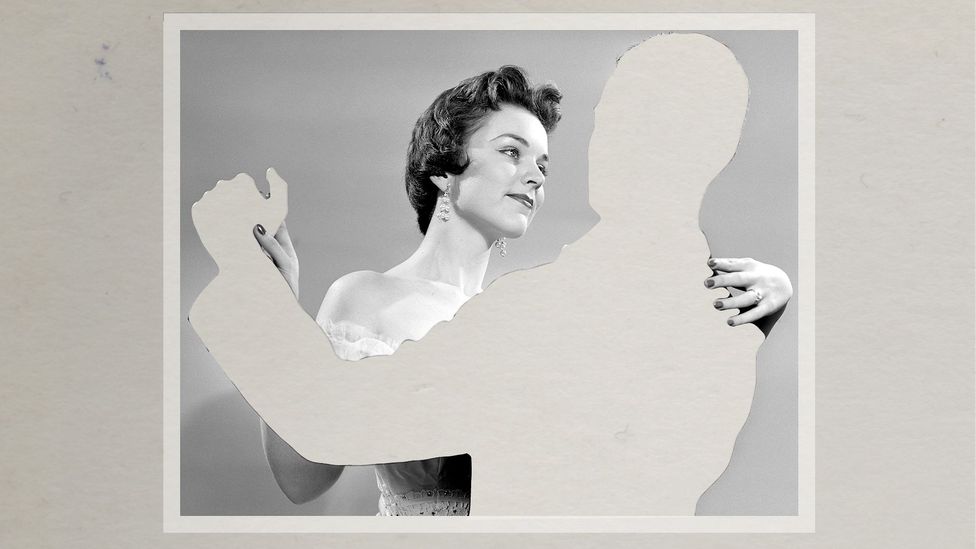
Bad break-up behaviours take been around for a long fourth dimension, but more recently they accept been given their own terms, like ghosting (Credit: Javier Hirschfeld/ Getty Images)
"The couple might experience a lot of conflict [during] the break-upward but still experience connected or love for their partner," says Dailey. "So it could be more about non being able to manage or resolve the conflict. If the pause-ups are ambiguous, people might experience like they made positive changes to the relationship and try once again."
Dailey likewise says attachment theory, popular is some areas of psychology and much covered in the media to explain some parts of compatibility in dating, does non explain romantic reconciliation.
Attachment theory suggests that caregivers' behaviour towards children shapes their zipper style in their adult life – they tin can be secure, anxious or avoidant towards other adults after on. A secure attachment style signifies a salubrious emotional advice, while anxiously-fastened individuals tend to doubt their self-worth and go to great lengths to restore proximity. A third group, those with avoidant attachment, are perceived as emotionally unavailable and self-sufficient by defensively refusing proximity.
Co-ordinate to this theory, partners with anxious and avoidant attachment styles are said to be attracted to each other and discover it difficult to break upward permanently. But, enquiry appears not to support this.
"Nosotros plant very picayune differences betwixt on-off and non-cyclical partners in attachment anxiety and avoidance, nor differences in how these attachment orientations are related to relational quality for such partners. Even though zipper theory seems like a good explanation, we haven't constitute this to be the example," says Dailey.
Like with Yannes, nostalgia and loneliness do play a role in pursuing forgiveness. "When people practise find themselves wanting to go back together with an ex even if they didn't treat them well, information technology is normally related to feelings of loneliness, missing the positive things well-nigh the relationship, and the sense of loss and grief that comes with a suspension-up," says Kristen Marking, a professor specialising in sexual health at the University of Kentucky. She says that nostalgia for past relationships frequently start emerges when the current relationship quality begins to endure.
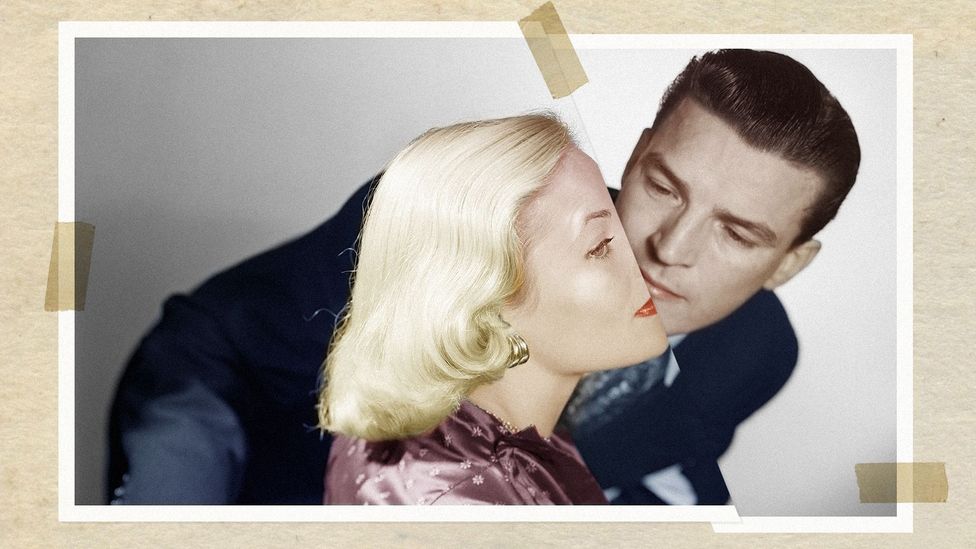
People who fearfulness being single written report a stronger desire to go back with an ex (Credit: Javier Hirschfeld/ Getty Images)
Those with a stronger fright of existence single written report a greater longing for their ex-partners and a stronger desire to renew the relationship. This might too explicate Yannes's behaviour in the electric current climate. She says she felt solitary during the coronavirus outbreak, prompting her to reach out to her previous lover and endeavour to mend their relationship.
The loneliness that locked-downwards single people are feeling could be exacerbated by social media, as it makes it easier for ane to keep their ex-lovers in sight. The desire to avoid loneliness at all costs tin can drive people back in the artillery of their ex-partners, co-ordinate to Gail Saltz, an associate professor of psychiatry at the New York Presbyterian Hospital Weill-Cornell School of Medicine.
"The invention of Facebook and other social media sites enable people to find old exes and bring them together," says Saltz. "We tend to run across past relationships in a rosier light than they necessarily were and forget that people tin change over time as well. Social media makes information technology harder to have closure and move on – stalking an ex's posts tin be very unhealthy."
With social media making separations stickier, it is perhaps unsurprising that Millennials and Gen Z could be fifty-fifty more susceptible to negative intermission-up behaviours, according to Berit Brogaard, a professor at the Academy of Miami who specialises in the philosophy of emotions and authored the volume On Romance.
"Bad intermission-upwardly behaviours take been around for every bit long every bit romantic love has," says Brogaard. "But that has become and then prevalent that they have been categorised and named – ghosting, submarining, benching, bread-crumbing, orbiting, zombieing and so on."
Younger Millennials and Gen Zs are much more than vulnerable to feet and depression and depend much more strongly on social approval than older Millennials, so the old may well exist prone to on-again/ off-again relationships, Brogaard added.
If Millennials and Gen Zs are built-in with laptops and tablets on their hands, they tend to await for dating solutions online. As a result, personal coaching businesses in the Usa alone were valued at more than than $1bn (£0.8bn) in 2018 and a niche marketplace for the heartbroken has started to emerge. Intermission-up coaches now promise to assist their clients move on or rekindle one-time romance. Many offer tips and strategies on their blogs, YouTube videos and podcasts which register views in the millions.
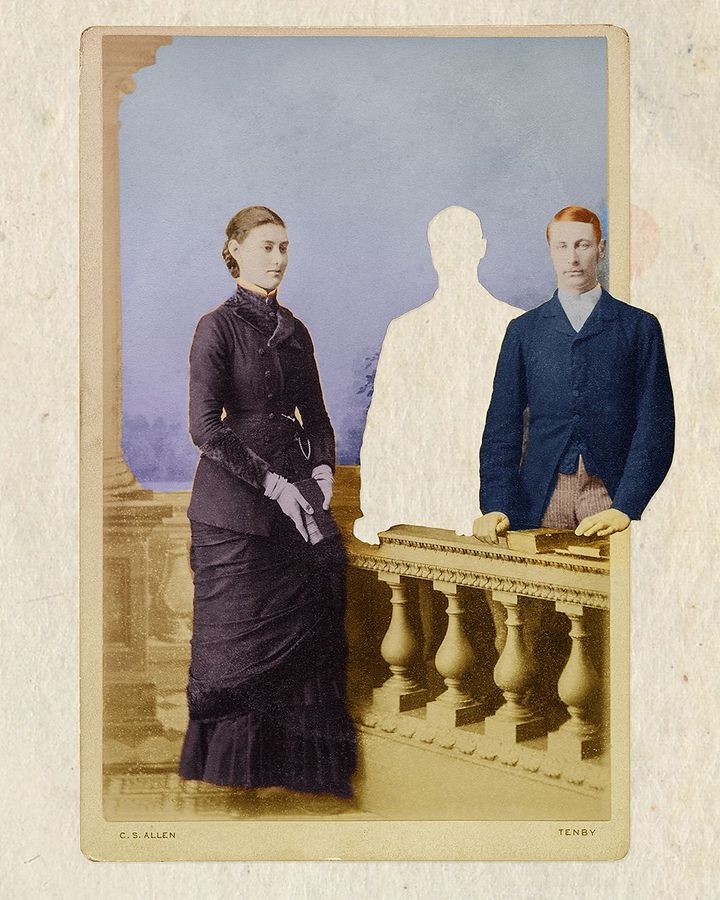
Keeping your distance afterwards a interruption upwards might exist a good thing regardless of whether yous desire to win them back (Credit: Javier Hirschfeld/ Alamy)
Among some popular ones, a "no-contact rule" (ranging from 30 days to 60 days, some even say infinitely), is a common tactic. This fourth dimension is supposed to be used to work on self-development. Many suggest sending texts to their exes to remind them of the good times they had and show them how they take changed during this period.
Neurologist and anthropologist Helen Fisher agrees a "no-contact rule" can be beneficial. She says a period of at to the lowest degree 90 days is proven to be effective to abstain from addictive substances. Merely would this piece of work with relationships?
"The way to accelerate mending a cleaved eye is similar to treating addiction – you put away their things, stop looking at their social media and have no contact with them," Fisher says.
Brogaard besides says that the dominion "does have some footing in science". The intensity of potent emotions – including anger, expose and so on – tends to lessen with fourth dimension.
Lilian, some other Hong Konger in her late 20s, was i of the heartbroken cyberspace users who searched for ways to reconcile with her ex boyfriend on the net a few days subsequently a break-upward. She bumped into a dating coach'south videos on social media.
Lilian says that the coach offered tips to create distance with the ex-partner and piece of work on re-attraction. "It comforted me afterward the separation, simply it also made me more anxious. The break-up bus suggested waiting for xxx days to contact the ex-boyfriend again, and to dress amend the next time nosotros meet to evidence that I have improved myself, only I couldn't expect that long," Lilian said.
Although these coaches might come up every bit an instant comfort after a heartbreak, their suggestions might non be scientifically credible. "Break-up coaches tend to lack proper training – self-preparation or academic – in relevant fields such equally neuroscience, psychology, cognitive science, philosophy or social work," says Brogaard.

I tip that so-called human relationship coaches suggest is to attempt to amend your image the next time you lot meet your ex (Credit: Javier Hirschfeld/ Getty Images)
The psychologist adds that some even plagiarise others who have relevant training, just they are unable to fact-cheque the information they lift from others.
"They can be more expensive than a good therapist, but without any evidence that the communication they offering is sound, you might exist wasting your time and money buying their products," she says. "Their books are sometimes more affordable, but not peer-reviewed and are for the most part practically useless."
Experts still have reservations about the industry, which has little to no regulations. Dailey seconded Brogaard's comment that a lot of interruption-up coaches "exercise not accept the qualifications to give advice," while Saltz says that it's not a 'regulated expanse'.
"Pretty much anyone can call themselves a coach. So I'd exist very cautious on that front. What amount, intensity and level of formalised preparation has this person really had? A several day or multi weekend course does not a therapist make. Who trained them, what type of training?" Saltz says.
Brogaard advises the heartbroken to read literature on break-ups and relationships from legitimate sources, including academic review papers on Google Scholar, instead of spending money on break-upward coaching. Merely she warns against spending a lot of time and free energy to win someone dorsum.
"If you have to leave of your way to become back with your ex, are they actually worth it?"
They said at that place are no "tricks" to reconciliation but to talk about what went wrong in the failed relationship with honesty.
For those who cannot reconcile with their former romance, the silver linings are that after the "protest" stage, their encephalon tin can become into a phase of "resignation/despair", so finally acceptance, indifference and growth, Fisher says.
"You feel extreme pain and anxiety, but finally there's recovery," concludes Fisher. "You never forget the person who dumps you lot, but yous move on and love someone new."
--
Bring together 1 million Hereafter fans by liking us on Facebook , or follow united states of america on Twitter or Instagram .
If yous liked this story, sign upwardly for the weekly bbc.com features newsletter , called "The Essential List". A handpicked selection of stories from BBC Future, Culture, Worklife, and Travel, delivered to your inbox every Friday.
Source: https://www.bbc.com/future/article/20200608-why-is-it-so-hard-to-forgive-an-ex
0 Response to "Someone Ine the Past Tried to Talk to You Again"
Post a Comment